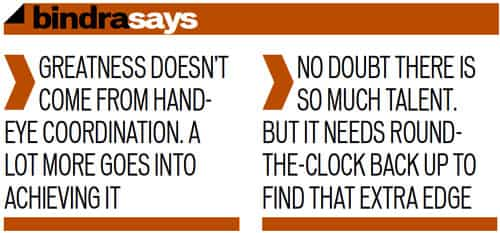Not just talent, infrastructure the key to producing champions
As our sports administrators continue to fight the International Olympic Committee over implementation of stringent ethical guidelines, which to me is non-negotiable, I want to talk about another thing our sport badly needs - a high performance training centre (HPTC). Abhinav Bindra writes.
As our sports administrators continue to fight the International Olympic Committee over implementation of stringent ethical guidelines, which to me is non-negotiable, I want to talk about another thing our sport badly needs - a high performance training centre (HPTC).

It is a state-of-the-art facility that works 24x7 and helps athletes get that extra edge. You can get experts on sports science to sports medicine, nutrition, bio-mechanics and even rehabilitation - all under one roof.
I had the chance to live and train in one such facility, the US Olympic Training Center in Colorado Springs, for two years. And the time I spent there was beyond doubt the best of my sporting life.
A wide gamut of athletes from different disciplines trained together, towards one goal. There was great camaraderie. The place smelled of fun, ambition, respect and energy. It was a place where history lived, where the past was pride and the future was built. You could trace every US Olympian on a computer and walk the Hall of Fame.
Simple things can make a difference. The US centre was not ostentatious. A cafeteria ran 24 hours offering different cuisines, discipline-specific food et al. It is the thought that goes into these that we are yet to replicate in our camps. We expect all athletes to function on more or less the same diet. Arre bhai, weightlifter ko extra chapati do, is the general mentality.

Greatness does not come from precise hand-eye coordination. A lot more goes into achieving it. Simple things like the preciseness of carbohydrates-protein ratio that goes into your system can make a difference.
Every time Andy Murray goes to the toilet an osmolarity check is done to track the percentage of water and minerals in his urine. This indicates whether the body is correctly hydrated. Monitoring is the key. In swimming, the OTC pool has a tunnel that creates a current to help swimmers go faster.
It's a way to make the body get used to the pace. Cameras over and under water track every move. Mo Farah worked out with a special respiration belt designed to train his inter-costal muscles made for him by the University of Loughborough.
High-altitude training, sleeping in high altitude rooms and then training in normal altitude, a newly extended partnership between UK Sport and the military defence giant Warton's aerospace engineers to help the taekwondo team, these are some instances where technology has provided a helping hand.
Virtual reality is being used by many HPTCs to create the exact environment for athletes, be it their home facility or the Olympic arena, in three dimension, sounds, temperature, crowds, everything is being reproduced to give athletes a feel of what they could be up against.
Physiology parameters and logs are maintained daily, right from assessing the quality of sleep to brain waves to heart rhythms.
Training plans for the day are devised keeping the data in mind so that there is quality and no overtraining. At that level one has to train smart.
The point I am trying to make is that for our sport to develop there is so much to do. The elite athletes need to find that edge in order to win. Competition at the highest level is killing.
In India, even though things have improved, our OTC, the NIS in Patiala, is a crumbling edifice of a once dazzling palace. I was recently told (I could be wrong) that the coaches course dates back to the 1980s. While I am sure they do a lot of great work, there is a desperate need to get better.
We need the top-notch expertise in India working nonstop with our athletes. No doubt there is so much talent. But talent needs round-the-clock top-notch back up to find that extra edge.
The IOC funds and helps set up high level academies. But of course, it's not relevant to suspended nations.





